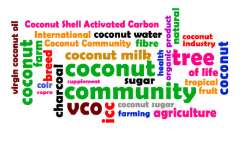Nurturing a Rural Community by Introducing Coconut Sap Sugar Technology in a Philippines Remote Location
Abstract
The farm level technology of processing coconut sap sugar from toddy is a social enterprise which created a significant change in the livelihood of the people dependent on the coconut trees in Aroman, Carmen, North Cotabato. Technical skills acquired through training, appropriate facilities, capital and access to market are the key factors in developing a farm-level technology were used to emerge a commercially viable social enterprise. Indicators of change were gauged through change in income, equality of income distribution and preference in household expenditure. The increased income was disposed of by an increase in the cost of living and altered purchasing preferences. Significantly, the highest change of expenditure was on food and less in education notably 25.81 and 20.44 percent. In the case of income distribution, even with 2.39 percent increase on the percent share of the lowest 20% income group, there was an improvement in the income of the farmer-processor “after” the project implementation. But still, the community remains within the inequitable income distribution status group. It is expected that another year of business will have further favourable impact on income distribution among the respondents.
References
Batugal, P. and Oliver, J. (eds). 2005. Poverty Reduction in Coconut Growing Communities. Volume III. Project Achievements and Impact, Serdang, International Plant Genetic Resources Institute, Regional Office for Asia, the Pacific and Oceania (IPGRI-APO).
Batugal, P., E.C. Manohar and M.L. George. 2008. ‘Good Practice for Poverty Reduction in Coconut Growing Communities in the Philippines’ in Agriculture and Rural Development for Poverty Reduction. United Nations Development Program.
Bickel, G., M. Nord, C. Price, W. Hamilton and J. Cook. March 2000. Guide to Measuring Household Food Security, Revised 2000. US. Department of Agriculture, Food and Nutrition Service, Alexandra VA.
Hart, T. December 2009. Exploring definitions of food insecurity and vulnerability: time to refocus assessments. Agrekon, Vol 48, No 4. Series of 2009 Available at www.ageconsearch.com
Jacobs, P.T. December 2009. The status of household food security targets in South Africa. Agrekon Volume 48. No. 4. Series of 2009. Available at www.ageconsearch.com
Manohar, E. C. A. A. Garcia and L.V. Sancha. 2006. Socioeconomic Assessment of the Poverty Reduction in Coconut Growing Communities Project in the Philippines: An IPGRI-PCA-CBOs Partnership.
Manohar, E.C. 2006. Socioeconomic Assessment of the Poverty Reduction in Coconut Growing Communities Project in the Philippines, IPGRI-PCA-CBO partnership. IFAR Fellowship report, Rome, International Plant Genetic Resources Institute (IPGRI).
Manohar, E.C. and Sancha, L.V. 2005. ‘Impact Assessment of the Poverty Reduction in Coconut Growing Communities Project in the Philippines’ In: P. Batugal and J. Oliver (eds) Poverty Reduction in Coconut Growing Communities. Vol. III: Project Achievements and Impact, Serdang, International Plant Genetic Resources Institute, Regional Office for Asia, the Pacific and Oceania (IPGRI-APO).











